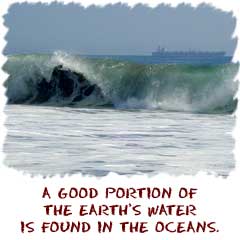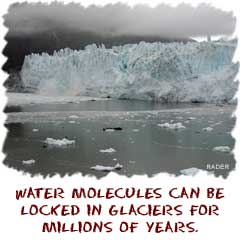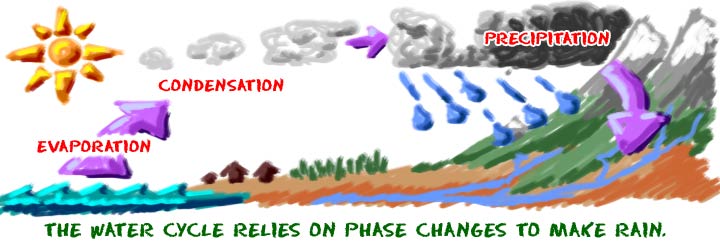 Water is everywhere on Earth. About seventy percent of the surface of the Earth is covered by water. If you were an alien visiting the planet, you would see a giant blue sphere from space (especially on the Pacific Ocean side). Not only is water everywhere, but all life depends on water. The tiniest bacteria and the largest dinosaurs have all needed water. Thehydrosphere is the world of water that surrounds all of us.
Water is everywhere on Earth. About seventy percent of the surface of the Earth is covered by water. If you were an alien visiting the planet, you would see a giant blue sphere from space (especially on the Pacific Ocean side). Not only is water everywhere, but all life depends on water. The tiniest bacteria and the largest dinosaurs have all needed water. Thehydrosphere is the world of water that surrounds all of us. Because water is so important, it makes up an entire section of the earth sciences. You will probably hear the term "hydro" many times. The prefix “hydro” has origins in ancient Greek. You will learn about hydrologists that study water and the way it is used and circulated across the planet. Hydrology is the study of water. That water may be at the bottom of the ocean or in clouds found in the atmosphere. Anything related to water is a part of the hydrosphere.
Importance of Liquid Water
 Water is in the air, on the land, between the rocks, and in every living thing. Water, in its purest form, is the compound H2O. There are twohydrogen (H) atoms bonded to oneoxygen (O) atom. Generally, you won’t find pure water. There are usually other compounds, ions, or particles mixed with water. While water may move and carry other substances with it, you need to remember that the small water molecules are the things that make life on Earth possible.
Water is in the air, on the land, between the rocks, and in every living thing. Water, in its purest form, is the compound H2O. There are twohydrogen (H) atoms bonded to oneoxygen (O) atom. Generally, you won’t find pure water. There are usually other compounds, ions, or particles mixed with water. While water may move and carry other substances with it, you need to remember that the small water molecules are the things that make life on Earth possible. Liquid water makes the Earth a special place. Our planet has a very nice temperature range that allows water to remain in a liquid state. If we were a colder place like Pluto, all of the water would be permanently frozen and solid. On the other hand, if we were on a very hot planet, all of the water would be in a gas state. Water vapor and solid water are relatively useless to the organisms of Earth.
Things get interesting when you start to have a system with solid, liquid, and gas states of water. Because all of the states exist on Earth, they are all important to scientists. There are solids in the deep glaciers, liquids of theoceans, and the vapor state of clouds. While there might not be a lot of life in or on those glaciers, they will eventually melt. Once they melt, they start to affect all of the life on Earth. All of the physical states are equally important because they are all connected.
The Life of a Water Molecule

Let’s say you're a water molecule. For this example we’ll assume you are staying a water molecule and not combining with other compounds. We’re going to have you move through the hydrologic cycle. You’ll start by sitting on the surface of the Pacific Ocean. All of a sudden you are filled with energy, evaporate, and move up into the atmosphere.
Winds are moving and you see yourself flying over the ocean towards land. Things start to get cold and all water vapor around you begins to condense. You all clump together and now you’re too heavy to stay in the clouds. You fall to the surface in a raindrop. If you are one of the first drops to fall, you might be absorbed into the soil. If you are at the end of a storm, you might wind up in runoff and drain into a river. From that river you could flow all the way back to the ocean and start your journey over again.
How much time does your journey take? Scientists think that if you are lucky enough to evaporate into a cloud, you spend about ten days floating around the atmosphere. If you're unlucky enough to be at the bottom of the ocean, percolate into an aquifer, or get stuck in a glacier, you might spend tens of thousands of years without returning to the hydrologic cycle. As of 2013, the oldest ice ever found was about 800,000 years old. That’s a long time to stay out of the water cycle.








0 comments:
Post a Comment